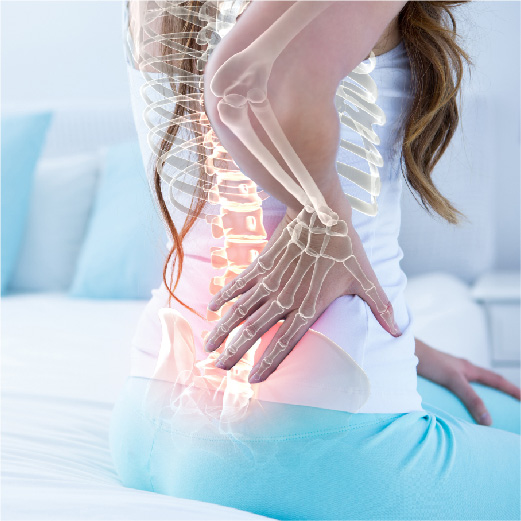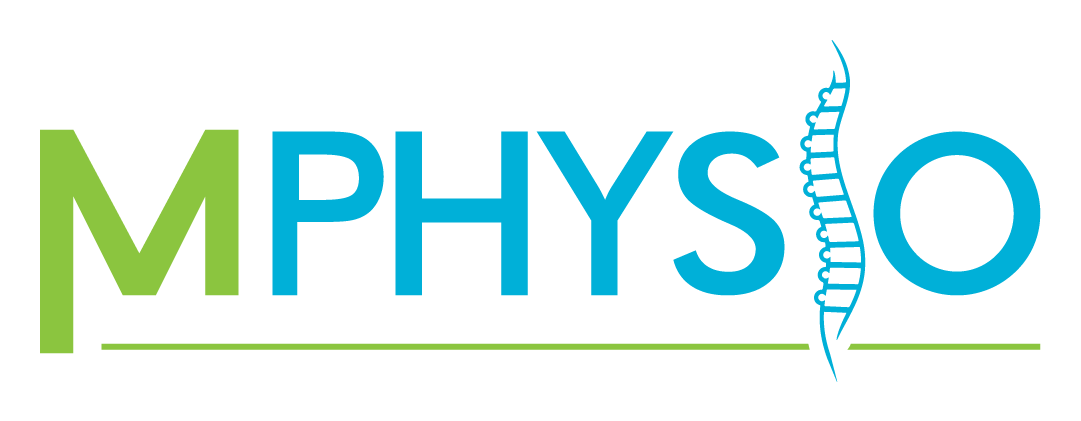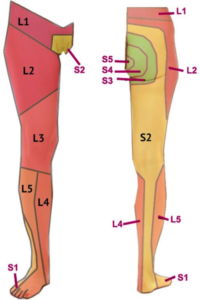What is Sciatica?
Sciatica is the term used to describe the symptoms of leg pain, sometimes accompanied by tingling, numbness and/or weakness, that arise from disruption or irritation of the sciatic nerve.
Sciatica is not a medical diagnosis, but rather a symptom of an underlying medical condition.

What are the symptoms of sciatica?
- Constant pain in only one side of the buttock or leg (rarely in both legs)
- Pain that is worse when sitting
- Leg pain that is often described as burning, tingling, or searing (versus a dull ache)
- Weakness, numbness, or difficulty moving the leg, foot, and/or toes
- A sharp pain that may make it difficult to stand up or walk
- Pain that radiates down the leg and possibly into the foot and toes (it rarely occurs only in the foot)
How does sciatica cause my pain?
On the picture, you can see that each individual nerve root will innervate a different area of the body. These areas are called dermatomes, and while they are slightly different for each person, can be mapped out, as seen in the diagram.
The Sciatic nerve originates from nerve roots of L4 to S3 in the lower back, that combine to form the Sciatic nerve, the largest single nerve in the body. Sciatica occurs when the Sciatic nerve is compressed at, or near its origin. Compression of the nerve may occur for a number of reasons, including disc herniation, degenerative disc disease, spondylolisthesis or spinal stenosis. Sciatica-like symptoms may also occur as the result of muscle tightness in the buttock region, a condition known as Piriformis Syndrome. While this is not true Sciatica, the symptoms can mimic that of true Sciatica. This is not an exhaustive list, but your physiotherapist will be able to diagnose the cause of your symptoms. The specific location of Sciatica symptoms depends on where the nerve is compressed.
How do I know I know what is causing my Sciatica?
A thorough assessment performed by your physiotherapist at Musculoskeletal Physiotherapy Australia is the best way to diagnose the cause of your sciatica. They will be able to guide on any extra investigations required and on the optimal treatment plan.

What can you do to treat my Sciatica?
Your Musculoskeletal Physiotherapy Australia Clinicians will determine the best course of action with regard to your Sciatica. The course of action will depend on your individualised clinical diagnosis and the true cause of your sciatica.
Usually, physio for sciatica will involve de-sensitizing the nerve and/or nerve roots through manual therapy, and strengthening supporting structures, while stretching any tight structures, such as in the case of Piriformis Syndrome.
We offer sciatica treatment at our Brisbane and Gold Coast clinics
What should I avoid to help my Sciatica?
- Avoid smoking.
- Avoid sitting for longer than absolutely necessary.
- Avoid sitting with slumped posture, or bending down to pick things up using a stoop lift.
- RECEIVE physiotherapy care to get your body performing to its optimum level
Keep good care of your body and have a regular physio for sciatica to continue monitoring your condition. Once your Sciatica has resolved you will be able to resume your full activities without worrying about future flare-ups.




